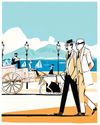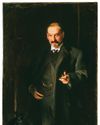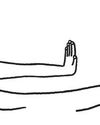
If Glenn Horowitz comes calling, should you be flattered or alarmed? It means that you have an exceptional literary reputation. It also means that your time on earth is nearly up.
Horowitz, a rare-book dealer of matchless temerity and flair, has sold the papers and possessions of more Nobel laureates than anyone else; he describes himself, with derisive pride, as "the Grim Reaper with a sack of shekels on his back." He sold the archives of Gabriel García Márquez, J. M. Coetzee, Nadine Gordimer, and Bob Dylan, as well as books from Derek Walcott's library, manuscripts of Seamus Heaney poems and Saul Bellow stories, spicy letters that he acquired from one of William Faulkner's mistresses, and Isaac Bashevis Singer's Yiddish typewriter.
He also sold Alice Walker's papers for $1 million, Vladimir Nabokov's for $1.375 million, Cormac McCarthy's for $2 million, Norman Mailer's for $2.5 million, and John Updike's for $3 million, arranging a deal between Harvard University and Updike's widow a few years after Updike said that allowing him into the house would be like "visiting the undertaker who's going to bury me."
Horowitz's knock is the scrape of the chisel on your tombstone. When he was preparing to sell Tony Kushner's archive, Kushner insisted that he not be marketed as the "Angels in America" guy, a one-hit-wonder. The dealer replied, "If you hadn't written 'Angels in America,' we wouldn't be having this conversation."
This story is from the {{IssueName}} edition of {{MagazineName}}.
Start your 7-day Magzter GOLD free trial to access thousands of curated premium stories, and 9,000+ magazines and newspapers.
Already a subscriber ? Sign In
This story is from the {{IssueName}} edition of {{MagazineName}}.
Start your 7-day Magzter GOLD free trial to access thousands of curated premium stories, and 9,000+ magazines and newspapers.
Already a subscriber? Sign In

BADDIE ISSUES
\"Wicked\" and \"Gladiator II.\"

LET'S MAKE A DEAL
\"Death Becomes Her\" and \"Burnout Paradise.\"

ANTI HEROES
\"The Franchise,\" on HBO.

FELLOW-TRAVELLERS
The surprisingly sunny origins of the Frankfurt School.

NOW YOU SEE ME
John Singer Sargent's strange, slippery portraits of an art dealer's family.

PARIS FRIEND - SHUANG XUETAO
Xiaoguo had a terror of thirst, so he kept a glass of water on the table beside his hospital bed. As soon as it was empty, he asked me to refill it. I wanted to warn him that this was unhealthy - guzzling water all night long puts pressure on the kidneys, and pissing that much couldn't be good for his injury. He was tall, though, so I decided his insides could probably cope.

WILD SIDE
Is Lake Tahoe's bear boom getting out of hand?

GETTING A GRIP
Robots learn to use their hands.

WITHHOLDING SEX FROM MY WIFE
In the wake of [the] election, progressive women, who are outraged over Donald Trump's victory at the ballot box, have taken to social media with public, vengeful vows of chastity. - The Free Press.

DEADLINE EXTENSION
Old age, reborn.